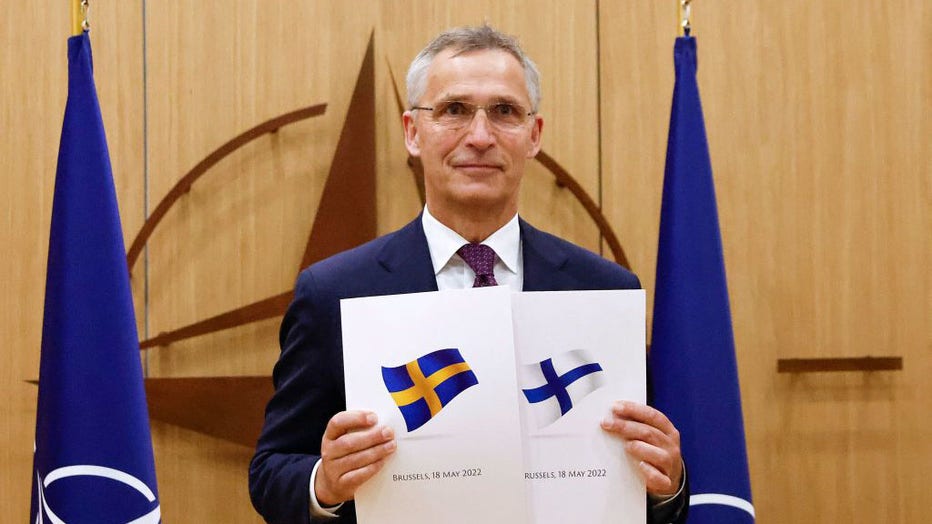Finland, Sweden apply to join NATO amid Russia's war on Ukraine
BRUSSELS - NATO Secretary-General Jens Stoltenberg said Wednesday that the military alliance stands ready to seize a historic moment and move quickly on allowing Finland and Sweden to join its ranks, after the two countries submitted their membership requests.
The official applications, handed over by Finland and Sweden’s ambassadors to NATO, set a security clock ticking. Russia, whose war on Ukraine spurred them to join the military organization, has warned that it wouldn't welcome such a move, and could respond.
"I warmly welcome the requests by Finland and Sweden to join NATO. You are our closest partners," Stoltenberg said. "All allies agree on the importance of NATO enlargement. We all agree that we must stand together, and we all agree that this is an historic moment which we must seize."
"This is a good day at a critical moment for our security," a beaming Stoltenberg said, as he stood alongside the two envoys, with NATO, Finnish and Swedish flags at their backs.
RELATED: Why a Finland, Sweden NATO membership would be a big deal
Russian President Vladimir Putin has demanded that the alliance stop expanding toward Russia's borders, and several NATO allies, led by the United States and Britain, have signaled that they stand ready to provide security support to Finland and Sweden should he try to provoke or destabilize them during the time it takes to become full members.
The countries will only benefit from NATO's Article 5 security guarantee — the part of the alliance's founding treaty that pledges that any attack on one member would be considered an attack of them all — once the membership ratification process is concluded, probably in a few months.
The move is one of the biggest geopolitical ramifications of the war and will rewrite Europe’s security map. British Prime Minister Boris Johnson welcomed it in a tweet and said that "Putin’s appalling ambitions have transformed the geopolitical contours of our continent."
For now though, the application must be weighed by the 30 member countries. That process is expected to take about two weeks, although Turkish President Recep Tayyip Erdogan has expressed reservations about Finland and Sweden joining.

FILE IMAGE - NATO Secretary-General Jens Stoltenberg poses with application documents presented by Finland's Ambassador to NATO Klaus Korhonen and Sweden's Ambassador to NATO Axel Wernhoff during a ceremony to mark Sweden's and Finland's application
If his objections are overcome, and accession talks go as well as expected, the two could become members soon. The process usually takes eight to 12 months, but NATO wants to move quickly given the threat from Russia hanging over the Nordic countries’ heads.
Canada, for example, says that it expects to ratify their accession protocol in just a few days — while in the Baltic region, Estonian Prime Minister Kaja Kallas tweeted: "I encourage a rapid accession process. We in Estonia will do our part fast."
Stoltenberg said that NATO allies "are determined to work through all issues and reach rapid conclusions."
The fact that the Nordic partners applied together means they won’t be losing time by having to ratify each other's membership application.
"That Sweden and Finland go hand in hand is a strength. Now the process of joining the talks continues," Swedish Foreign Minister Ann Linde told the Swedish news agency TT.
It shouldn't take long to win approval in the Baltic states of Estonia, Latvia and Lithuania. Their prime ministers issued a joint statement on Wednesday saying that they "fully endorse and warmly welcome the historic decisions" taken in Helsinki and Stockholm.
Public opinion in Finland and Sweden has shifted massively in favor of membership since Russia invaded Ukraine on Feb. 24.
Finland and Sweden cooperate closely with NATO. They have functioning democracies, well-funded armed forces and contribute to the alliance’s military operations and air policing. Any obstacles they face will merely be of a technical, or possibly political nature.
NATO’s membership process is not formalized, and the steps can vary. But first their requests to join will be examined in a sitting of the North Atlantic Council (NAC) of the 30 member countries, probably at ambassadorial level.
The NAC will decide whether to move toward membership and what steps must be taken to achieve it. This mostly depends on how well aligned the candidate countries are with NATO political, military and legal standards, and whether they contribute to security in the North Atlantic area. This should pose no substantial problem for Finland and Sweden.
Moving forward, during accession talks that could be concluded in just one day once the terms of those negotiations are set, the two will be asked to commit to uphold Article 5 and to meet spending obligations concerning the NATO in-house budget, which runs to around $2.5 billion dollars, split proportionally among what would be 32 member countries.
Finland and Sweden would also be made aware of their role in NATO defense planning, and of any other legal or security obligations they might have, like the vetting of personnel and handling of classified information.
RELATED: McDonald's to sell its 850 restaurants in Russia, says business there 'no longer tenable'
___
Jari Tanner in Helsinki and Jan M. Olsen in Copenhagen contributed to this report.



